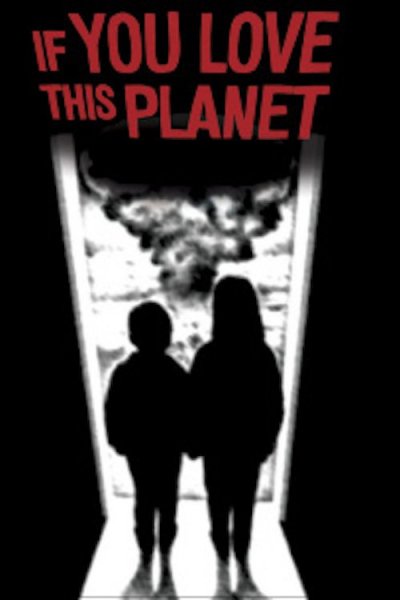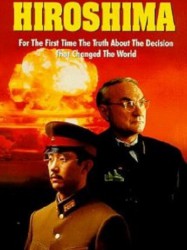Si cette planète vous tient à coeur est un film canadien de genre Documentaire
Si cette planète vous tient à coeur (1982)

Si vous aimez ce film, faites-le savoir !
Durée 26minutes
OrigineCanada
Genres Documentaire
Themes L'environnement, Documentaire sur l'environnement, Documentaire sur la guerre, Documentaire historique, Documentaire sur le nucléaire, Documentaire sur les technologies
Note71%










If You Love This Planet is a 1982 short documentary film recording a lecture given to SUNY Plattsburgh students by physician and anti-nuclear activist Dr. Helen Caldicott about the dangers posed by nuclear weapons. The movie was directed by Terre Nash and produced by Edward Le Lorrain for Studio D, the women's studio of the National Film Board of Canada. Studio D head Kathleen Shannon was executive producer.
Released during the term of the Reagan administration and at the height of Cold War nuclear tensions between the United States and the Soviet Union, If You Love This Planet was officially designated as "foreign political propaganda" by the U.S. Department of Justice and suppressed in the United States. The subsequent uproar over that action gave the film a publicity boost; it went on to win the 1982 Academy Award for Documentary Short Subject. It appears that the first cinema showing of the film in Britain did not occur until April 2008, when it was screened by the London Socialist Film Co-op.
^ "CENSORED: Wielding the Red Pen (Online Exhibit)". University of Virginia Library. Retrieved 23 November 2013.
^ Verbinski, Jane (April 1983). "If You Love This Planet Gov't censors pick best short". Jump Cut (28): 64. Retrieved 23 November 2013.
^ "If You Love This Planet". The New York Times. Retrieved 2008-12-01.
^ Matthew Hays, "Montreal Oscar Stories: Two of the city's award-winners reminisce" Montreal Mirror, March 21, 1997. Accessed 2008.12.18.
Commentaires
Postez un commentaire :
Suggestions de films similaires à Si cette planète vous tient à coeur
Il y a 8959 ayant les mêmes genres cinématographiques, 2393 films qui ont les mêmes thèmes (dont 43 films qui ont les mêmes 6 thèmes que Si cette planète vous tient à coeur), pour avoir au final 70 suggestions de films similaires.Si vous avez aimé Si cette planète vous tient à coeur, vous aimerez sûrement les films similaires suivants :
 , 1h
, 1hRéalisé par Saul Landau
Genres Documentaire
Thèmes L'environnement, Documentaire sur l'environnement, Documentaire sur la guerre, Documentaire historique, Documentaire sur le nucléaire, Documentaire sur la politique, Documentaire sur les technologies, Politique
Acteurs Saul Landau

Building Bombs (1991)
, 54minutesRéalisé par Mark Mori
Origine Etats-Unis
Genres Documentaire
Thèmes L'environnement, Documentaire sur l'environnement, Documentaire sur la guerre, Documentaire historique, Documentaire sur le nucléaire, Documentaire sur les technologies
Acteurs Jane Alexander
Note62%






No More Hiroshima (1984)
Genres Documentaire
Thèmes L'environnement, La mer, Transport, Aviation, Documentaire sur l'environnement, Documentaire sur la guerre, Documentaire historique, Documentaire sur le nucléaire, Documentaire sur les technologies, Politique, Documentaire sur la Seconde Guerre mondiale

Nuclear Tipping Point (2010)
, 56minutesGenres Documentaire
Thèmes L'environnement, Documentaire sur l'environnement, Documentaire sur la guerre, Documentaire historique, Documentaire sur le nucléaire, Documentaire sur les technologies, Politique
Note67%






Hiroshima (1995)
, 3h10Réalisé par Roger Spottiswoode, Koreyoshi Kurahara, Hideo Sekigawa
Origine Canada
Genres Drame, Documentaire
Thèmes L'environnement, La mer, Transport, Aviation, Documentaire sur l'environnement, Documentaire sur la guerre, Documentaire historique, Documentaire sur le nucléaire, Documentaire sur les technologies, Politique, Documentaire sur la Seconde Guerre mondiale
Acteurs Eiji Okada, Kenneth Welsh, Ken Jenkins, Yumeji Tsukioka, Tatsuo Matsumura, Wesley Addy
Note77%





The film opens in April 1945 with the death of Franklin Roosevelt and the succession of Harry Truman to the presidency. In Europe, the Germans are close to surrender, but in the Pacific the bloody battle for Okinawa is still underway and an invasion of the Japanese home islands is not foreseen until the autumn. American battle casualties have almost reached 900,000, with Japanese casualties at 1.1 million, and some 8 million Asian civilians have died in the war that began with Japan's invasion of Manchuria in 1931.

Atomic Café (1982)
, 1h26Réalisé par Kevin Rafferty
Origine Etats-Unis
Genres Documentaire, Historique
Thèmes L'environnement, Documentaire sur l'environnement, Documentaire sur la guerre, Documentaire historique, Documentaire sur le nucléaire, Documentaire sur les technologies, Politique
Note75%





A base de documents mélant actualités, archives gouvernementales et archives militaires, le portrait à la fois effrayant et hilarant d'un pays qui, des abris anti-atomiques à la propagande gouvernementale, instaure un véritable climat de paranoïa chez ses citoyens, les faisant devenir réfractaires à tout ce qui ne porte pas le label "made in USA"...
 , 1h
, 1hOrigine Etats-Unis
Genres Documentaire
Thèmes L'environnement, Documentaire sur l'environnement, Documentaire sur la guerre, Documentaire historique, Documentaire sur le nucléaire, Documentaire sur une personnalité, Documentaire sur les technologies
Note54%





 , 1h26
, 1h26Origine Etats-Unis
Genres Guerre, Documentaire
Thèmes L'environnement, La mer, Transport, Aviation, Documentaire sur l'environnement, Documentaire sur la guerre, Documentaire historique, Documentaire sur le nucléaire, Documentaire sur les technologies, Politique, Documentaire sur la Seconde Guerre mondiale
Note81%





Les victimes d'Hiroshima et Nagasaki racontent. Les bourreaux aussi.

Bombes à retardement (2007)
, 46minutesRéalisé par Guylaine Maroist
Origine Canada
Genres Documentaire
Thèmes L'environnement, Politique, Documentaire sur l'environnement, Documentaire sur la guerre, Documentaire historique, Documentaire sur le nucléaire, Documentaire sur une personnalité, Documentaire sur la santé, Documentaire sur les technologies, Politique
Acteurs Vlasta Vrána, Réal Bossé
En 1957, 40 jeunes soldats canadiens sont envoyés au Nevada pour servir de cobayes humains. Ils seront exposés à des explosions nucléaires quatre fois plus puissantes que celle d'Hiroshima, et cela à moins de 1 000 mètres. Ces hommes seront victimes de radiations et certains de leurs enfants naîtront avec des malformations. Bombes à retardement révèle une page sombre de l'histoire militaire au Canada. Basé sur des films d'archives inédits, ce film fait revivre l'expérience des soldats qui sont suivis 50 ans plus tard dans leur quête de justice auprès du gouvernement canadien.

The Fog of War (2003)
, 1h35Réalisé par Errol Morris
Origine Etats-Unis
Genres Guerre, Documentaire, Historique
Thèmes L'environnement, Documentaire sur l'environnement, Documentaire sur la guerre, Documentaire historique, Documentaire sur le nucléaire, Documentaire sur les technologies, Politique
Acteurs Errol Morris
Note80%





Sont principalement évoqués son rôle pendant la Seconde Guerre mondiale, l'accession au pouvoir du président Kennedy puis la crise des missiles de Cuba, et le déploiement de l'armée américaine au Vietnam.
 Connexion
Connexion